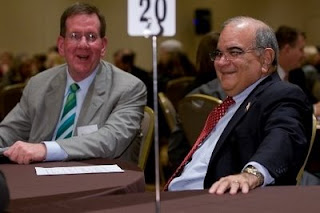On behalf of the National Association of Criminal Defense Lawyers, I attended the hearing before Judge Cooke today dealing with the motion to dismiss Count I of the indictment, the conspiracy to violate the "criminally derived property" statute, 18 U.S.C. section 1957. Here's a brief synopsis of what occurred (and yes, I am obviously biased as NACDL filed a brief in support of the motion to dismiss).
The issue on Count I is whether an attorney (Ben
Kuehne) can be prosecuted under 1957 for receiving legal fees in light of 1957(f)(1)'s exception for "transaction[s] necessary to preserve a person's right to representation as guaranteed by the Sixth
Amendment to the Constitution."
Judge Cooke started the hearing by asking the prosecutor to present his argument on the defense motion to dismiss because she wanted to know if he was really taking the position that 1957(f) was meaningless. The prosecutor answered YES! The prosecutor took the position that as a matter of law the motion should be denied because 1957(f) does not afford any protection to lawyers. He then argued that as a matter of fact,
Kuehne's actions were not "necessary" to represent Ochoa and therefore not covered by the statute. And finally, he argued that if the judge disagreed with 1 & 2, she should at least present the question to a jury because 1956(f) is an affirmative defense.
John
Nields then argued for Ben
Kuehne.
Nields argued that the statutory text is clear and that it must have meaning. He explained that the government could forfeit an attorney's fee if it was tainted, but it could not prosecute him under 1957. Judge Cooke asked what would happen if a defense lawyer participated in a drug transaction and then took a fee to represent the drug dealer.
Nields argued that the defense lawyer could be prosecuted for lots of things under that hypo, but not 1957.
Judge Cooke questioned both the prosecution and the defense about the bright-line rule they were proposing. She tested the government theory that 1957(f) offers no protection vs. the defense's position that it affords an attorney absolute protection
in a criminal case under 1957 for receiving a legal fee (it does not, for example, protect against forfeiture or a prosecution under a different statute).
Ultimately, the defense position is much more persuasive. Section 1957(f) cannot be meaningless as the prosecution suggests. The prosecution's reading of the statute is an assault on the Sixth Amendment, an assault on criminal defendants, and an assault on criminal defense lawyers. It seeks to chill lawyers from taking legal fees in criminal cases. The prosecution's arguments that (1) it will only prosecute the egregious cases and (2) if it doesn't, a jury will protect the defense bar, offers no comfort. Criminal defense lawyers will be chilled into refusing any fee for the fear of prosecution itself, even if they would likely be acquitted.
Kuehne's reputation and standing in the community has suffered by the mere prosecution. He has had to raise money for the defense. He has been indicted in a serious federal case. Criminal defense lawyers shouldn't have to rely on the good graces of the government or a jury to make the right decision because Congress has spoken very clearly on this issue -- defense lawyers shall not be prosecuted for accepting a legal fee. Period.
Roy Black's firm did more in this case to vet the fee than any case in the history of the law -- it spent over $200,000 because it wanted to make sure that it was doing everything correctly. And Black hired the most ethical lawyer in the community to do the vetting, Ben
Kuehne.
Count I should be dismissed.
There were lots of other motions being argued, but this is the one of most interest. I hope this post generates some discussion.


